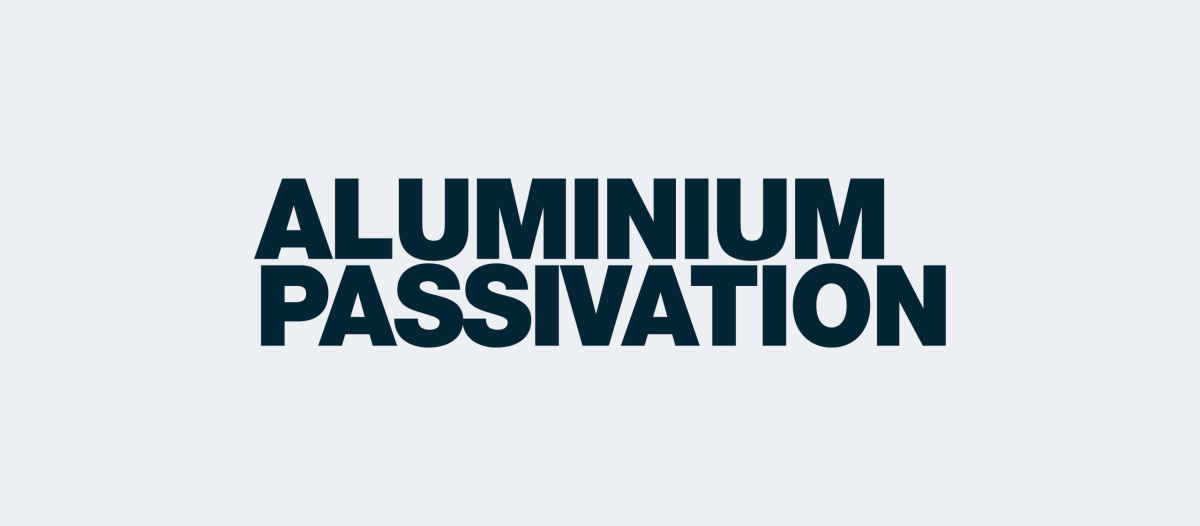Aluminium passivation is a process that treats the surface of aluminium to create a protective layer that prevents corrosion and improves durability. Methods include anodizing, chemical treatments, and mechanical polishing. Benefits include increased corrosion resistance, enhanced appearance, and improved performance in various industries. Passivation is crucial for ensuring the longevity and reliability of aluminium surfaces.
Table of Contents
What is passivation?
Passivation is a process that treats the surface of aluminium to create a protective layer that prevents corrosion and improves durability. Anodizing involves immersing aluminium in an electrolyte solution and passing an electric current through it to stimulate the formation of aluminium oxide. Chemical treatments involve applying a specific solution to the aluminium oxide. Mechanical polishing removes impurities to allow for the formation of protective oxide layer.
Environmental considerations in passivation include the use of chemicals and waste disposal. It is important to properly handle and dispose of any chemicals used in the process to minimize environmental impact. Additionally, utilizing more eco-conscious passivation methods and practices can help reduce the overall environmental footprint of aluminium passivation processes.
What is the process of passivation for aluminium
The process of passivation for aluminium involves treating the surface to create a practice oxide layer that enhances corrosion resistance and durability. The steps of passivation for aluminium typically include cleaning the surface to remove any contaminants, followed by one of the passivation methods such as anodizing, chemical treatments, or mechanical polishing.
It is essential to follow proper cleaning procedures and select appropriate passivation methods to ensure the effectiveness of the protective layer. Attention should also be given to environmental considerations, such proper chemical handling and disposal, to minimize any negative impact on the environment.
Why should you consider passivation?
There are several key benefits to consider for aluminium surface passivation. Some of the main advantages include:
Corrosion resistance: The nature of aluminium is that it forms a thin layer of protective oxide which helps prevent corrosion and rusting to some degree. This extends the lifespan of the aluminium and maintains its appearance over time. However, passivation is still important as it helps improve the overall corrosion resistance of aluminium, making it more durable.
Improved durability: The protective oxide layer created through passivation enhances the overall durability of aluminium, making it more resistant to wear and tear from environmental factors such as moisture, chemicals, and temperature fluctuations.
Enhanced appearance: Passivation can give aluminium surfaces a more aesthetically pleasing finish by creating a smooth and uniform oxide layer. This can be particularly advantageous for industries where appearance is important.
Maintenance of properties: Passivation helps maintain the mechanical and physical properties of aluminium, ensuring that it performs well under various conditions and retains its original characteristics.
How we at DST-CHEMICALS can help you with aluminium passivation
At DST-CHEMICALS, we can assist customers with aluminum passivation through our specialized product, DST-PAS. DST-PAS is designed to effectively protect, ensuring long-lasting durability and performance. This product is particularly beneficial for the manufacturing industry, where aluminum components are widely used.
Read more about DST-PAS here
Questions and Answers
What is passivation and why is it important for aluminium surfaces?
Passivation is a vital process for aluminium surfaces that involves treating the material to form a protective oxide layer. This layer enhances corrosion resistance, improves durability, maintains appearance, and preserves mechanical and physical properties.
In which industries is passivation commonly used for aluminium surfaces?
Passivation is commonly utilized in industries such as manufacturing and remanufacturing, where corrosion resistance is crucial for safety, longevity, and performance.
How can considering passivation benefit industries using aluminium surfaces?
By implementing passivation for aluminium surfaces, industries can ensure the integrity and reliability of their products and equipment, leading to improved quality and longevity.
Nick Bjerregaard
International Process & Technical Manager
Technical Manager at DST-CHEMICALS: 20 years of chemical industry experience, driving innovation, efficiency, and environmental sustainability.
Environmental, social and governance
At DST-CHEMICALS, sustainability is at the heart of everything we do. We engaged with key stakeholders, including our team of suppliers, to ensure we focused on what truly mattered. Ready to see the full picture? Keep an eye out for our ESG report, where we share the next steps in our journey to sustainability.

